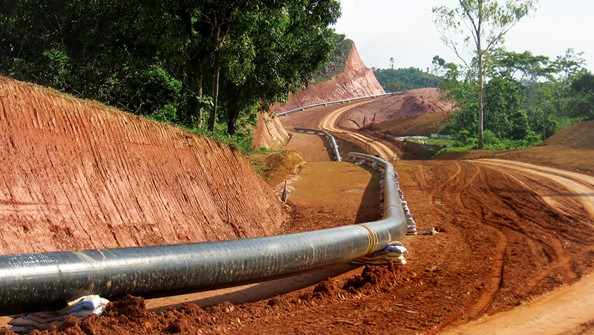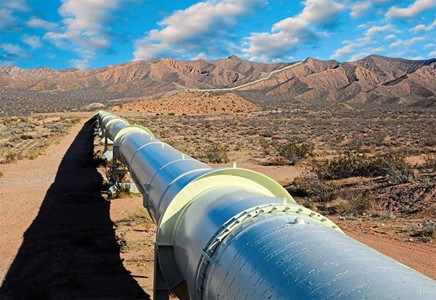We decided it was time to write about what a specialist pipeline maintenance service provider can do for AD plant owners and operators that inject pressurized renewable natural gas (RNG) into the gas grid, with so many new biogas plants producing upgraded biomethane injected into the gas grid.
This article goes back to the basic principles to establish the service specialism that contractors acting as pipeline maintenance service providers offer. (Water and gas pipelines are very similar and the service is interchangeable.)
[boomdevs_toc]

What Does A Pipeline Maintenance Service Provider Do?
There are plenty of invisible structures that make our world so sophisticated. We look at the big buildings, and we think that we've come quite far. However, real progress can be seen underground.
During the day, we need to drink eight glasses of water, and we also go to the bathroom multiple times. All that water needs to go somewhere, and yet, it's invisible in every city's infrastructure. That's the beauty of something as simple as pipelines.
They do all the work and barely get the credit they deserve. Now we're going to look at all the things that a pipeline maintenance service provider does and how that helps you. Click on this link to read more.

Why are there so many pipeline failures?
Many factors are responsible when it comes to the health of a single pipe. First of all, there's the environmental impact. If a strong earthquake hits, there's nothing that can save the piece of metal. Secondly, there are all the opportunities for human error.
A single inattentive worker can destroy a million-dollar investment. Last but not least is corrosion. As a matter of fact, 65% of all failures when it comes to pipelines are caused by corrosion. That is why many countries in the world are putting laws in place.
When it comes to systems that carry water, they need to be inspected every five years. On the other hand, if the system is transporting gas, then it can be checked every seven years. There was a bill passed in the United States, and many European and Asian countries followed. This is quite important since it will reduce the number of failures, as well as the impact on the environment.
Mechanical cleaning
Depending on the substance that's transported in the pipes, there can be different deposits. If there is a large amount of glycol, amines, compressor oil, asphaltene, black powder, paraffin, or bacteria, the system can get clogged.
Most service providers agree that mechanical pigging is the best way to clean deposits and clogs. They do this by sending a pig, not the animal, of course, through the lines to swap all the deposits. However, this method is quite exhausting because you can never know whether the entire pipeline is clean.
When the pig moves back inside, it will carry a bit of the deposit inside. When multiple instances of this process occur, the particles inside can be ground up to super tiny microparticles that can cause corrosion in the long run.
Newer methods, such as optical inspection and magnetic flux leakage, are superior to traditional methods. The optical inspection can allow a three-dimensional view of the insides of the system. When it comes to the analysis part, the readings are much more accurate.
When you inspect the readings, you can see whether you need to go through the entire process again. Most of the time, the sensors tell you in real time which part is lagging, and the crew has an easier time.
If there is any deposit left in the pipeline, then that carries a significant risk of polluting and contaminating the water. The same thing is true about natural gas. Even after cleaning, some parts can't be reached. In that case, the bare steel needs to be tested with the sensors of the intelligent pigging mechanism.
Advanced chemical cleaning
Advanced methods always take a bit more work. That's true for any Industrial Pipeline Repair Company in the world. But they also bring in the best results. When it comes to chemical cleaning, this is likely to become standard in the industry in the next couple of years.
No one can deny that mechanical cleaning is amazing, but there are a few downsides to the entire process. When you add in a chemical with the mechanical pig, you can remove more of the contaminants, and you don't need to do it as much.
The companies mix in a cleaning solution into water or alcohol, and then they push it inside the pipes. There are plenty of different manufacturers that are trying to get the exact percentage right when it comes to the cleaning solution.
Any company can make it as long as they pay attention to a few criteria. The first one is that the mixture needs to be pH neutral and have penetrating and permeating capabilities. Of course, environmental concerns need to be taken into consideration.

The reason this solution works better is simple. Pipes don't get damaged evenly. Some places inside get corroded while others remain intact. There's no way in which the metal pig can expand in the places that need inner cleaning.
Let's say that a part of the inside of a pipe has corroded, and there is a small hole that's now filled with debris. A cleaning solution will start removing layers from the rubble since it will penetrate the material. With a few runs, the contaminant will be piled away, layer by layer, because the adhesive forces will be wakened.
Finally, it will be removed with the regular motions. This process is so good that it can be used even while the system is online. No operations will be interrupted. That directly impacts your bills, as well as your production processes. Every facility needs to switch to chemical cleaning because it's the most cost-effective in the long run.
A few final words on Pipeline Maintenance Services
Maintenance is not something that you do once and then forget about it. It's something that needs to happen every few years, and you want to be as thorough in the process as possible. This involves making sure that there are no leaks and that the insides are completely clean.
Based on the ways we described above, you can save a lot of money if you know how to take care of water, oil, and gas systems. The World Corrosion Organization reported that corrosion is responsible for 2.2 trillion dollars of wasted pipes. Not to mention the health deterioration of people who drink lead-infused water. That's why maintenance is crucial.
FAQ: Understanding Pipeline Maintenance Services
1. What Does a Pipeline Maintenance Service Provider Do?
Answer: Pipeline maintenance service providers are responsible for the upkeep and repair of underground and overground pipelines.
They ensure that these critical infrastructures for water, oil, and gas distribution remain functional, safe, and efficient. Their tasks include inspection, cleaning, repairing, and sometimes replacing sections of pipelines.
2. Why are Pipeline Failures Common?
Answer: Pipeline failures can be attributed to several factors:
- Environmental Impact: Natural disasters like earthquakes can cause significant damage.
- Human Error: Mistakes made during construction or maintenance can lead to failures.
- Corrosion: A major cause, accounting for approximately 65% of pipeline failures.
3. What is Mechanical Cleaning in Pipeline Maintenance?
Answer:
- Process: Involves sending a cleaning device (known as a ‘pig') through the pipeline to clear out deposits and blockages.
- Limitations: While effective, it may not completely clean the pipeline and could potentially cause corrosion over time.
- Advancements: New methods like remote optical inspection and advanced leakage detection offer more thorough cleaning and accurate trench openings for repairs.
4. How Does Advanced Chemical Cleaning Work?
Answer: A pipeline maintenance service provider conducts chemical cleaning as follows:
Process: A mixture of cleaning solutions can be pushed through the pipeline, alongside mechanical pigs, to remove contaminants more effectively.
Benefits: This method is thorough, as it penetrates and removes debris from unevenly corroded areas within the pipeline. It's also considered cost-effective and can be done without disrupting the system's operation.
5. Why is Regular Pipeline Maintenance Important?
Answer: Regular pipeline maintenance is important for the reasons that follow:
Prevents Leaks and Failures: Regular maintenance helps in identifying and fixing potential weak points.
Health and Safety: Ensures that contaminants like lead do not seep into water supplies.
Economic Impact: Proper maintenance can prevent significant financial losses due to damaged infrastructure, as corrosion alone causes immense economic waste.
6. How Often Should Pipelines Be Inspected?
Answer: A pipeline maintenance service contractor will normally provide pipeline inspections at the following frequency:
Water Systems: Recommended every five years.
Gas Systems: Advised every seven years.
These frequencies may vary based on national regulations and the condition of the pipeline system. Always check local and contractual requirements.
7. What is the Role of Technology in Pipeline Maintenance?
Answer: Technology plays a crucial role in enhancing the efficiency and effectiveness of pipeline maintenance.
Techniques like optical inspection provide a 3D view of the pipeline's interior, allowing for precise identification of problem areas. Intelligent pigging mechanisms equipped with sensors offer real-time analysis, improving the maintenance process.
8. What are the Environmental Considerations in Pipeline Maintenance?
Answer: Any pipeline maintenance service contractor conducting maintenance processes must consider environmental impacts, especially when using chemicals.
Solutions used in chemical cleaning should be pH-neutral and environmentally friendly. Additionally, maintenance work should aim to minimize the risk of contaminating water or disrupting natural habitats.
9. How Does Pipeline Maintenance Affect Consumer Bills?
Answer: Effective and efficient pipeline maintenance can lead to cost savings, which may reflect lower client costs and even reduced utility bills for consumers. Minimized downtime and reduced need for extensive repairs contribute to overall cost-effectiveness.
10. What Are the Long-Term Benefits of Regular Pipeline Maintenance?
Answer: A pipeline maintenance service contractor can provide the following benefits:
Infrastructure Longevity: Extends the life of the pipelines.
Economic Savings: Prevents costly emergency repairs and replacements.
Public Health and Safety: Ensures clean and safe distribution of water and gas.
[Published on 17 January 2021. FAQ added November 2023.]








It’s interesting to know that chemical cleaning is quite common when it comes to getting pipeline services. One of my dream is to have my own bread factory someday so it would be nice to make sure that I am familiar with all of its important components. I can imagine that pipelines will have to be secured for that kind of facility.